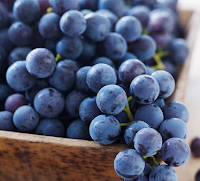When my dad was diagnosed with prostate cancer last summer, one of
the first things his oncologist advised him to do was drink Concord grape juice—a lot of it every day. Why? Because grapes, particularly those deep-purple
Concord grapes, contain a powerful antioxidant and known cancer fighter.
We all know that fruits and veggies are central to a healthy diet, but some varieties,
especially purple foods, pack a more powerful punch than others.
“Most antioxidant-rich foods are lower in calories and nutrient rich and can prevent
or delay health problems,” says Angela Ginn, RD, a national spokesperson for the Academy of Nutrition and Dietetics and an education coordinator at the University of Maryland Center for Diabetes and Endocrinology at Maryland General Hospital in
Baltimore. “Also, they’re rich in fiber to satisfy your appetite when controlling weight.”
Purple foods are loaded with antioxidants, but that’s not their only great quality. Vitamin K for bone health, flavonoids and polyphenols that may prevent cancer, and acids that increase brain health are just a few bonuses you’ll get by munching on these fruits.
GRAPES
Grape skins, specifically those from red and purple grapes, contain a phytochemical called resveratrol, which studies suggest contains potent antioxidants and anti-inflammatory properties that prevent cancer.
Other research indicates resveratrol’s ability to slow the growth of cancer cells and prevent the formation of tumors in the lymph nodes, stomach, liver, and breast. It can also promote the death of leukemic and colon cancer tumors. In addition, grape skins are full of antioxidants that can help prevent cardiovascular disease and keep cholesterol levels in check.
“Grapes are a good source of vitamin K and manganese, too,” says Teerawong Kasiolarn, ND, a naturopathic doctor at Nova Medical Group in Virginia. Just 1 cup of grapes provides 33% of the Daily Value of manganese, which helps regulate blood sugar and improve bone and nervous tissue health. One cup also provides 17% of the Daily Value of vitamin K, which helps prevent heart disease and directs calcium from blood vessels to bone.
Research from the National Health and Nutrition Examination Survey conducted
between 2001 and 2006 linked grapes and grape juice consumption to a higher Healthy
Eating Index, a measure of diet quality compared with the federal dietary guidelines.
In addition, studies have shown that people who eat grapes tend to consume
more fruits overall, take in more vitamin C and potassium, and consume less fat, saturated fat,
sodium, and added sugar. Research from the University of Glasgow in Scotland linked specific phytonutrients in Concord grapes to cardiovascular wellbeing
and healthy aging, and researchers are also investigating the potential positive effect of grapes
on colon health. And the list goes on. Kasiolarn explains that natural practitioners in Europe have been using grape seeds to treat blood flow conditions such as venous insufficiency and chronic venous insufficiency;
vision problems associated with diabetes, such as diabetic retinopathy; and arteriosclerosis,
high blood pressure, and wound healing.
PRUNES
In addition to being a great source of dietary fiber, vitamin A, and antioxidants, researchers say prunes can significantly improve cardiovascular health by reducing bad cholesterol and systolic blood pressure.
Prunes are also loaded with potassium, which halts the negative effects of sodium on blood pressure and helps regulate fluid and mineral balance in and out of cells. “A quarter cup of prunes provides 316.6 milligrams of potassium,” says Ginn, who adds that
prunes can help normalize blood sugar and also protect against macular degeneration.
Research also shows that prunes can significantly reduce high levels of enzymes that correlate with liver diseases, and they act as a mild laxative. But here’s an inside tip: Heated prune juice speeds the laxative effect.
BLUEBERRIES
OK, you got us. While blueberries don’t have the deep purple color of plums or grapes, you don’t want to pass them up. A recent study conducted at City of Hope, a comprehensive cancer center near Los Angeles, shows that eating blueberries not only provides the body with helpful antioxidants but also may help fight a form of breast cancer known as triple-negative breast cancer. Preliminary studies found that blueberry extract exhibited antitumor
activity in vitro against this type of breast cancer cells in vitro. Further research led to the discovery that bioactive substances in blueberries can slow the progression and spread of these cells.
Blueberries not only help fight cancer, but studies show that adding a few berries to your daily diet can help maintain healthy skin, improve brain health and aging, and decrease diabetes risk in adults.
According to Ginn, certain antioxidants found in blueberries can postpone the onset of cognitive problems such as memory loss. “One cup of raw blueberries provides 3.6 grams of dietary fiber, 24% of your Daily Value of vitamin C, 36% of your Daily Value of vitamin K, and 25% of your Daily Value of manganese,” adds Kasiolarn.
— Deborah R. Huso













Yorumlar
Yorum Gönder